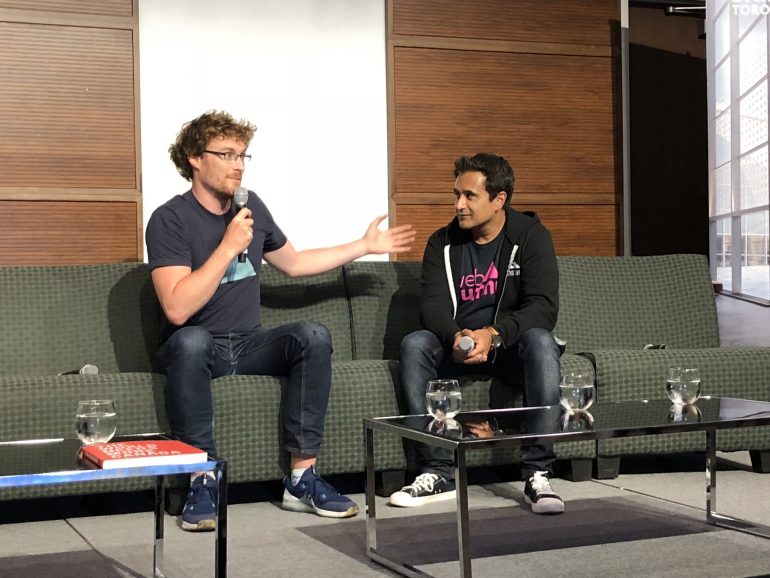Last night, Collision’s organizers hosted an event at the MaRS Discovery District to get the local tech ecosystem excited for the massive tech conference, which attracted 25,000 to New Orleans this past May.
“This is an industry and an ecosystem that has developed, and when I’m travelling—taking groups abroad to London, Israel, and India to promote our tech ecosystem—a lot of people didn’t know much about us being a powerhouse,” Toronto Mayor John Tory said during the event. “But I think that has been changing, and that’s been changing because we’ve been selling, and that’s changing because of announcements like the one we’re here to celebrate today.”
In early April, BetaKit broke the story about Collision choosing Toronto as its next location after Web Summit’s founder Paddy Cosgrave put out a call seeking the next city to host its sister event after three years in New Orleans.
BetaKit confirmed the relocation to Toronto in early May, with Canadian Prime Minister Justin Trudeau chiming in on the excitement with an announcement video.
In a podcast interview with BetaKit editor-in-chief Douglas Soltys before the main event, Cosgrave said that Trudeau’s advocacy-along with Mayor Tory and Techstars managing director Sunil Sharma-was a major factor in the decision, despite the fact that the Prime Minister’s global profile sometimes draws ire here at home.
“Just as a foreigner, someone who’s not Canadian, the value that Trudeau brings just in elevating the salience of Canada is huge,” said Cosgrave.
By choosing Toronto @CollisionHQ shows we’ve built a global tech hub that has the world’s attention.
In 2 years, the number of tech jobs in Toronto will surpass all of Silicon Valley.#CollisionConf will showcase our city, our talent, and help build our future. https://t.co/t99aCb5RNW
— John Tory (@JohnTory) June 25, 2018
In a letter on LinkedIn at the time of the announcement, Cosgrave listed Toronto and Canada’s multiculturalism as one of the reasons for choosing the city. “We know that quite a number of tech entrepreneurs from around the world were denied entry into the United States to attend Collision 2017. That pattern, despite our best efforts, has continued in 2018,” he wrote at the time.
Cosgrave doubled down on that sentiment during a fireside chat Sharma, citing the challenges of hosting a global conference in the United States, whose president makes it clear that he wants to close its borders to the world.
He gave the example of getting “dozens and dozens” of Collision attendees from Iranian universities and companies in New Orleans two years ago, but not receiving a single attendee from that country for its most recent conference in May.
“Whatever the reasons were for that, many people said they were dissuaded, many people applied for Visas and said they didn’t get it,” Cosgrave said. “When you try to build—and Collision is a very global event—it’s a terrible shame not to have the best entrepreneurs and the most interesting investors and the most interesting executives all over the world in one room. If anyone is excluded, even one person, I think that’s to the detriment of the event.”
“A global conference of Collision’s scale provides unmatched advantages to local companies seeking to go global." – @TorontoRBOT's @desilvajanet at #CollisionConf's launch in #Toronto with @TorontoComms at @MaRSDD ? pic.twitter.com/qbthmGsTTL
— Collision Conf (@CollisionHQ) June 25, 2018
Closer to home, OMX founder and CEO Nicole Verkindt said that an event at the scale of Collision could have a major positive impact for the city, both in the short and long term. She alluded to a point made by Sharma earlier that events like Collision inspired intrapreneurship and larger and more traditional industries.
“My technology measures economic impact for ‘super sexy’ industries like infrastructure, major capital projects…and what we’ve found that each dollar you spend on your supply chain and each sale a company makes, there’s this long-term impact,” said Verkindt. “Getting big corporations and government, getting traditional sectors involved, and stopping this conversation about technology as its own sector and starting to say ‘this is a critical piece of our entire economy and big corporations need to embrace it’.”
The notion of embracing the opportunity was seconded by Jan De Silva, President and CEO of the Toronto Region Board of Trade, who urged the Toronto tech community to “get ready for 2019 now.” Noting that Collision will feature more attendees than downtown Toronto has hotel rooms, she suggested that the assembled room start prepping their Airbnb listings.


